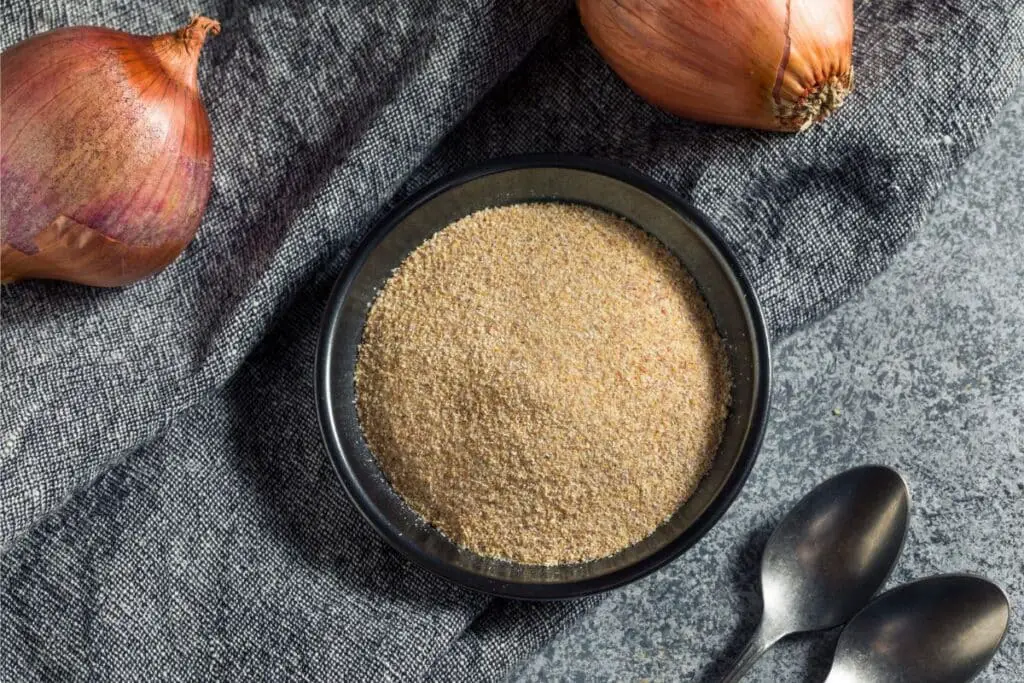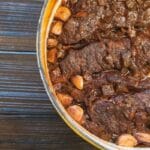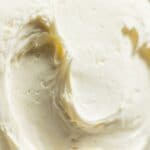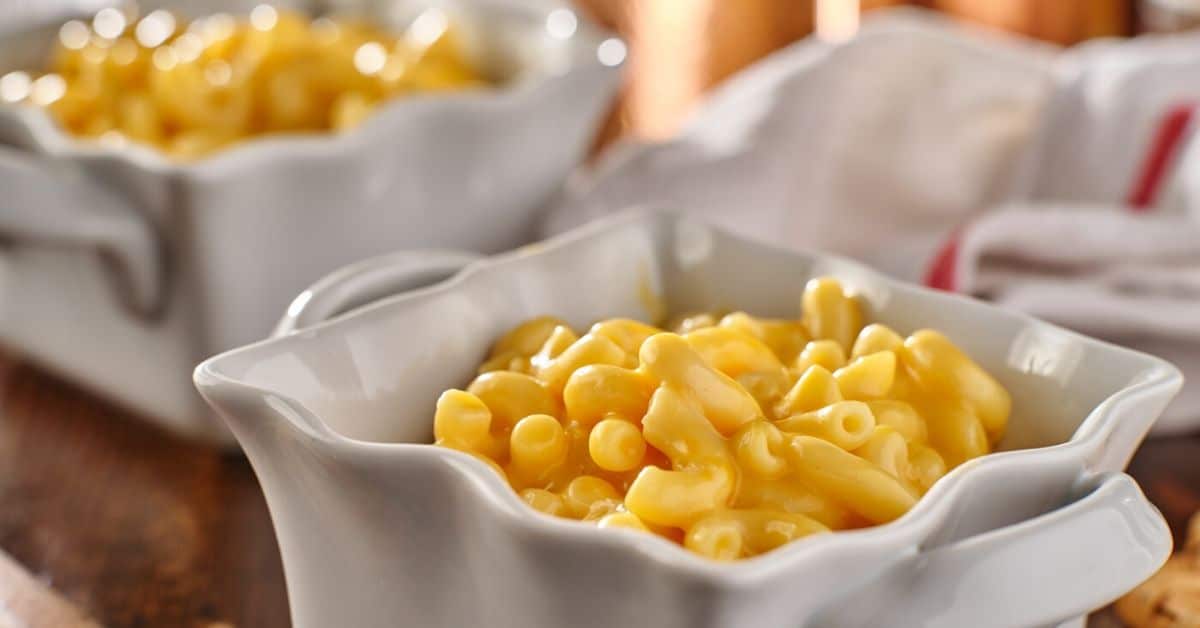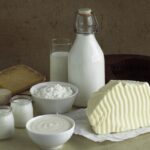In summary: There are some of the best substitutes for onion powder, such as dried onion flakes, onion salt, onion paste, garlic powder, garlic salt, etc. Each substitute is described with its suitable uses and recommended quantities for substitution.
Onions turned into a spice – it’s pretty genius and incredibly flavorful!
Since these onions are dry roasted before being dehydrated and ground, they bring a unique flavor to dishes that regular onions can’t fully match. In addition, the powder can be evenly distributed in sauces and stews and used as a spice rub or coating which is also not possible with regular chopped onions.
If you don’t have onion powder on hand, leaving it out of your recipe entirely is not recommended since an important part of seasoning and flavor will be missing.
There are however a few alternative ingredients you can use as an onion powder substitute to bring a similar depth and punchy flavor to savory dishes.
In this guide, we’ll help you choose the best substitute for onion powder from items you very likely already have in the pantry or refrigerator.
What Is Onion Powder?
Onion powder adds a complex depth to recipes. It can be made from brown or white onions by using either the whole vegetable or only the skin, stems, or root. This, and the fact that it is dry roasted, contributes to a much deeper taste than just adding regular onions into a sauce or stew.
Onion powder can be used in a coating for fried items, to season meat or eggs, in marinades, dressings, dry rubs, stews, curries, vegetable dishes, and sauces.
Best Onion Powder Substitutes
#1. Dried Onion Flakes
The flakes are our top choice to substitute onion powder since they are also plain dehydrated onion. The only difference is that they have been left in slightly larger flakey pieces as opposed to being ground into a fine powder.
You can grind the flakes in a spice grinder to make your own onion powder or use them as they are. They have the same concentrated flavor and will therefore bring a similar richness and depth to your dish.
They are great as a replacement in soups, casseroles, stir fry, salads, stews, and breading or coatings.
Substitute quantity: Replace a teaspoon of onion powder in equal quantities with the flakes or homemade onion powder.
#2. Onion Salt
Onion salt is another near-perfect option to replace onion powder since it is also in a powder form with a strong onion flavor. It does however have a high sodium content. When using this as your substitute, do not add salt again to your recipe.
Onion salt is suitable as a substitute in almost any application from meat rubs and dressings to stews, sauces, soups, eggs, and marinades.
Substitute quantity: Replace the onion salt in equal quantities.
#3. Onion Paste
This is a thick paste made from pureed fresh onions. To make your own paste, blend fresh chopped onion in a food processor or blender until it turns into a smooth paste (this is a great way to use leftover onions). Pour the paste into an ice cube tray.
To prevent the whole freezer from smelling, cover the tray in a double layer of plastic wrap before placing it into the freezer.
Once the cubes are frozen solid remove them from the tray and store them in a Ziploc freezer bag or airtight container until you need them.
If you are using the cubes in a soup or stew you can add them frozen. For other applications, defrost them completely before using them. You can add this to marinades, stir fry, casseroles, and sauces.
Substitute quantity: When thawed, use 2 to 3 tablespoons of the paste as a substitute for one teaspoon of the powder.
#4. Garlic Powder
Garlic has a fairly potent flavor so we recommend using this in cooked dishes and using less than your recipe calls for. Although it will add a different flavor to your dish the similar texture makes it suitable as a seasoning and in spice rubs.
Remember that not everyone likes the taste of garlic so you may want to be careful how much you use when cooking for others.
Substitute quantity: Use only half the amount required in your recipe.
#5. Garlic Salt
This mixture of garlic powder and salt is a great seasoning for stocks, casseroles, marinades, spice rubs, soup, pasta, potato dishes, meat, and poultry. It has a very high salt content so might not be suitable for people trying to follow a low sodium diet.
You will need to cut back on salt elsewhere in your recipe when using this as a replacement to prevent it from overpowering the dish entirely.
Substitute quantity: Use only half the amount called for in your recipe and adjust the salt level.
#6. Fresh Onion
The most obvious onion powder alternative is chopped fresh onions or minced onion, however, it didn’t make the top of the list because neither the texture nor the consistency will be the same. This option is not suitable for meat rubs or coating fried items but can be a wonderful option in stew, casseroles, curry, stir fry, and rice dishes.
Although you will get a similar flavor, keep in mind that the type of onion you use will influence the taste and that the fresh vegetable will add a lot more moisture to your dish.
The flavor is also less concentrated so you will need to use a much larger quantity and may need to add some additional seasonings.
Substitute quantity: Use one cup of chopped fresh onion to replace one tablespoon of powder.
See more: Replacement for onion
#7. Scallions
Scallions, otherwise known as spring or green onions, look a little different but have a similar taste to regular onions. They have long green stalks with small white bulbs. The entire plant is edible and can be added or chopped in raw and cooked dishes.
To get a similar punch of flavor you will need to use more scallions in your dish and keep in mind that the texture will be different since it is not in a powder form.
It won’t be suitable as a meat rub but can be added to soup, salad, stew, stir fry, chicken, meat, rice and vegetable dishes, and casseroles.
Substitute quantity: Use three times the amount called for in your recipe to get the same punch of flavor.
#8. Shallots
Shallots are similar to onions but somewhat smaller with a slightly sweeter taste. As with other fresh ingredients, you will have to use a lot more to get the same potency as the concentrated powder. Shallots also have a higher moisture content which will affect the texture.
Substitute quantity: Mince two shallots as a replacement for one tablespoon of powder.
#9. Leeks
Leeks have a somewhat milder taste but with very similar flavor notes. These long thick green stalks are popular in soups, and stews, and added to chicken, meat, and vegetable dishes.
Substitute quantity: Finely chop the leeks and use one cup of leeks to replace one teaspoon of powder to get the same flavor strength.
#10. Chives
Chives are actually a herb and have long thin green leaves. They are a good option in raw or cold dishes since they lose a lot of their flavor when cooked. Chop up the grass-like leaves finely to add to salads, eggs, dips, dressings, and garnishing stir fry and soup.
Substitute quantity: Use four times the amount of chopped chives to get a similar flavor into your dish. For example, if your salad or dressing calls for ½ a teaspoon of powder, use two teaspoons of chopped chives.
#11. Fennel Bulbs
Fennel is not going to give you the same flavor or texture, but it will add a depth of flavor with a bitter-sweet touch. As with other vegetable substitutes (as opposed to powders) it will add either crunchiness to raw dishes or moisture when cooked.
For this reason, it’s best used as an addition to stews or soups. The great thing about fennel is that you don’t need to add a large quantity to add a punch of flavor.
Substitute quantity: Use twice the amount of minced fennel bulb than the powder required in the recipe.
FAQs
Does onion powder go bad?
Yes, onion powder can go bad over time. Like other spices, it can lose its flavor, aroma, and potency due to exposure to air, light, and moisture. Proper storage in an airtight container in a cool, dark place can help extend its shelf life.
Should I keep onion powder in the fridge?
It’s not necessary to keep onion powder in the fridge, but storing it in a cool, dark place in an airtight container is recommended to maintain its flavor and potency over time. Refrigeration can introduce moisture, which may affect the quality of the powder.
How do you know if your spices have expired?
Expired spices often lose their vibrant color, aroma, and flavor. If your spices appear dull, have a muted scent, or lack the usual intensity when tasted, they might have passed their prime and should be replaced for optimal results in your cooking.
What is a substitute for onion and garlic powder?
A suitable substitute for onion and garlic powder is using fresh minced onion and garlic, which can provide a more vibrant and authentic flavor to your dishes. Alternatively, you can use other seasonings like shallot powder, celery seed, or herbs like chives and parsley to add depth to your recipes.
Conclusion
The alternative to onion powder that you choose will depend largely on what you are using it for. Powder alternatives are suitable as a replacement in any recipe including meat rubs, flavored butter, marinades, and egg dishes.
On the other hand, substitutes that constitute chopped veggies such as leeks, spring onions, or shallots, are best used only in dishes with a saucy profile such as stews and soups since the bulk and texture will affect the consistency of the dish.
*image by bhofack2/depositphotos
